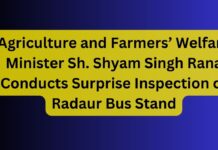Excessive Use of Fertilizer
Investigations carried out under All India Coordinated Research Project on ‘Long Term Fertilizer Experiments’ over five decades at fixed sites have indicated that continuous use of nitrogenous fertilizer alone had deleterious effect on soil health and crop productivity showing deficiencies of other major and micro nutrients. Even with recommendated doses of NPK and more, deficiency of micro and secondary nutrients has become yield limiting factors over the years. Deficient nutrient may also affect plant growth and cause plant physiological disorders. There is also possibility of nitrate contamination in groundwater above the permissible limit of 10 mg NO3-N /L due to excessive/over-use of nitrogenous fertilizers, particularly in light textured soils that has consequence on human/animal health if used for drinking purpose. ICAR recommends soil test based balanced and integrated nutrient management through conjunctive use of both inorganic and organic sources of plant nutrients to reduce the use of chemical fertilizers, preventing deterioration of soil health, environment and contamination of groundwater. In addition, split application and placement of fertilizers, use of slow releasing N-fertilizers and nitrification inhibitors, growing leguminous crops and use of resource conservation technologies (RCTs) are also advocated.
As per the latest information available, the consumptions of chemical fertilizers in the country during 2017-18, 2018-19, 2019-20 and 2020-21 (upto kharif 2020) are 54.38, 56.21, 59.88 and 33.85 million tonnes of fertilizer products (Urea, Di-Ammonium Phosphate (DAP), Murate of Potash (MOP), Complexes and Single Super Phosphate (SSP), respectively.
The Government has launched a National Mission on Soil Health Card to promote soil test based balanced and judicious fertilizer application in the country. Similarly, organic farming is being promoted under Parampragat Krishi Vikas Yojana (PKVY) and Mission Organic Value Chain Development for North East Region (MOVCD-NER) in the country. Trainings and demonstrations are organized through ICAR institutions including Krishi Vigyan Kendras (KVKs), and agricultural universities to educate farmers on all these aspects.
This information was given in a written reply by the Union Minister of Agriculture and Farmers Welfare Shri Narendra Singh Tomar in Lok Sabha.

 हिंदी
हिंदी






